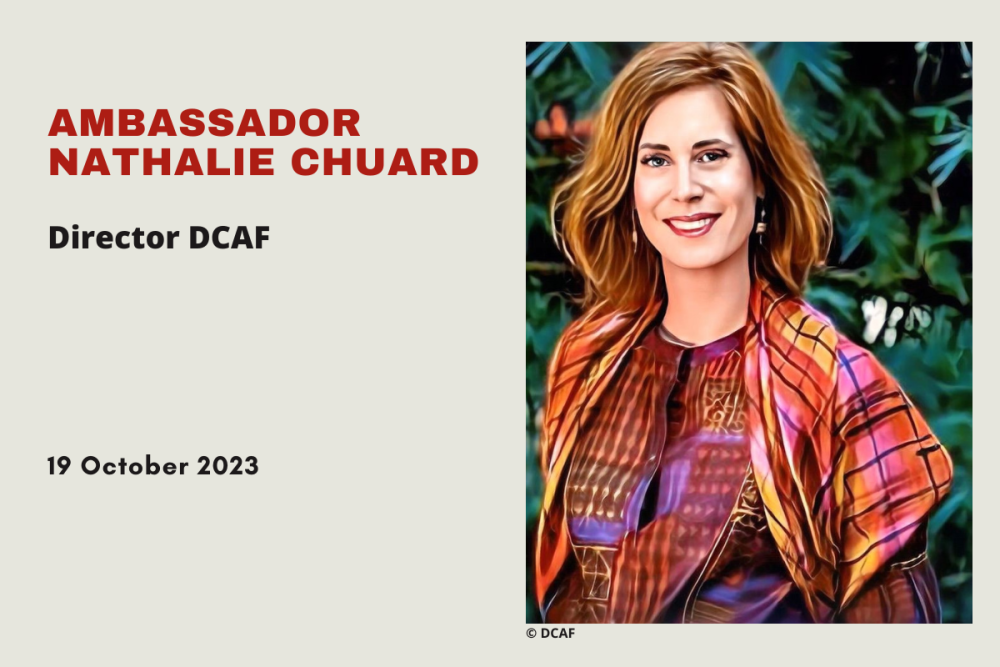The interview | Nathalie Chuard
 |
How would you present your organization in a few words? What entails your position? What is your goal? |
Founded 23 years ago, DCAF - Geneva Centre for Security Sector Governance is dedicated to making people safer through more effective and accountable security and justice. We have over 220 employees in 14 offices around the world, including our head office in Geneva, and we are recognized for our leading expertise in governance and security sector reform.
I was appointed to lead this fantastic organization in March 2023, and every day I look forward to working with an incredibly committed team of experts.
Accountable, transparent, and effective security sector governance, founded on the rule of law and respect for human rights for all, is a decisive contributor to peace and sustainable development, and I am proud of DCAF’s people-centred approach.
Our work is complex but, I believe it is more important and necessary than ever, given the current state of the world. That's why one of our priorities is to increase our agility to better support our partners in fragile or conflict-affected countries. In Ukraine, for example, that includes training security institutions in International Humanitarian Law or on how to support survivors of conflict-related sexual violence.
 |
Among the concentration of actors in Geneva (IOs, NGOs, permanent missions, academia, and the private sector), who do you work with and how? |
DCAF has deep roots in International Geneva. One of our priorities is to build relationships with all key players in Geneva so that we can share our expertise at the international level.
We are one of the five founding members of the Geneva Peacebuilding Platform, which aims to facilitate interaction on peacebuilding between organizations and sectors. Our goal is to contribute to discussions in Geneva, get out of our comfort zones, and also enable grassroots organizations to participate in the conversation.
With the support of the Swiss Government and while Switzerland sits on the UN Security Council, we are organizing discussions in New York for the first time this autumn. That will enable us to nurture connections with institutions there and bring some of the spirit of Geneva across the pond.
More broadly, we engage with many different organizations daily, such as the UN and the ICRC, to help develop standards and improve coordination and coherence in the field of international assistance for national security sector reform.
To this end, we also partner with many permanent missions in Geneva. Our Foundation Board, which comprises 54 members representing 51 States and the Canton of Geneva, is the cornerstone of our governance and the link to our activities on the ground. Without the support of our partners and donors, DCAF would be unable to carry out its mandate.
 |
What are the strengths and weaknesses of Geneva with regards to the development of your activity? |
DCAF works at the intersection of human rights, development, and peace and security. Our mission benefits from synergies between these three areas and contributes to advancing the goals of International Geneva.
DCAF is recognized as a neutral organization. Our work is governed by principles of impartiality, local ownership, inclusion, and gender equality. These principles are our strength, and because of them we are frequently called on by a range of State and non-state actors to assist them in their reform processes and help establish democratic supervision of the security sector.
To strengthen our local expertise, we seek to further enhance our ability to work with partners on the ground and amplify the voices of local communities, including within International Geneva. Bridging the gap between policy and practice, making a difference in the lives of people in affected communities, and leaving no one behind, in the spirit of the 2030 Agenda for Sustainable Development, are key priorities.
 |
What do you think global governance should look like 20 or 30 years from now? |
There are so many challenges. Conflicts are becoming increasingly complex and are often fuelled by deep-seated grievances against public institutions, as well as by an increasingly multipolar world. To address this, we need more inclusive and participatory models of governance that give civil society organizations a bigger role. That would help amplify the voices of local communities, women, and youth to find new answers to the fundamental problems facing our world.
We need to address these challenges starting today, by enhancing multilateralism to support the principles of democracy, rule of law, and human rights, all central elements of good governance in the security sector. In a complex world, more than ever, we need to be able to talk with each other and come up with solutions collectively.
For example, DCAF contributed to the UN consultations leading up to the launch of the Secretary-General's New Agenda for Peace, as the promotion of good security sector governance is an essential component of better conflict prevention.
We also need to take collective action to address transnational security challenges driven by climate change, the increase in forced migration, and the revolutionary changes made possible by emerging technologies, including artificial intelligence.
 |
What question would you like to have been asked? And what keeps you “awake at night”? |
Right now, the multiplication and escalation of conflicts across the world – including with the horrific loss of civilian lives and suffering in the Middle East - trouble me a lot. It seems like the world has lost its humanity. For DCAF and other organisations, it is becoming more and more complex to respond to the needs of our partners and ensure the safety of our teams. At the same time, we are absolutely convinced that we need to remain engaged in fragile contexts, as to prepare the ground for more accountable and inclusive security institutions when the time is right and therefore contribute to peace building.
Climate change is also a big worry for me. Along with the deterioration of the environment it causes, climate change is a serious threat to peace and security in the 21st century. The security and justice sectors have an important role to play in fighting climate change and its impacts. That is where DCAF's expertise can be a force for change, by empowering security and justice institutions to embrace a comprehensive approach to protecting people, the planet, and peace.
